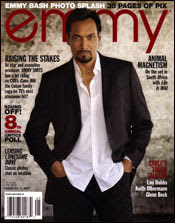Archive of American Television interview with producer Robert Halmi, Sr., featured in Emmy magazine
 The latest issue of Emmy magazine (Issue No. 5, 2007, with Cane's Jimmy Smits on the cover) includes selections from our Archive of American Television interview with producer (nearly 200 television movies and miniseries) and chairman of RHI Entertainment, Robert Halmi, Sr. He was interviewed for two hours in May, 2007.
The latest issue of Emmy magazine (Issue No. 5, 2007, with Cane's Jimmy Smits on the cover) includes selections from our Archive of American Television interview with producer (nearly 200 television movies and miniseries) and chairman of RHI Entertainment, Robert Halmi, Sr. He was interviewed for two hours in May, 2007.
Halmi’s credits include many of the most acclaimed broadcast and cable productions of the past four decades: Lonesome Dove, The Josephine Baker Story, Gypsy, Gulliver’s Travels, In Cold Blood, The Odyssey, Merlin, Moby Dick, Dinotopia, The Lion in Winter and Human Trafficking. At eighty-three, Halmi maintains a busy schedule. He lives primarily in New York and London and spends the first week of production on location for every one of his films. He runs RHI Entertainment with his son Robert Halmi, Jr., having reacquired the company in 2006 from Hallmark, which bought it in 1994.
Below are some excerpts from the article:
Q: You did some documentaries for television, then moved to features, but quickly returned to TV. Why?
A: I decided that maybe features were not for me. They were too complicated. I wanted to do television, but I didn’t want to go to t do it on my own. So I went to General Foods — they were fully sponsoring television shows then — and said I would like to make a film of the Hemingway short story “My Old Man.” This was to be my very first television movie, 1979. Typical for television — General Foods loved it, but the “problem” was, it was about an old man and a boy. They wanted a girl in the lead because the demographic was female. I had to get permission from the Hemingway estate to change the character to a girl. I hated it, but thehe networks. I thought I couldn I found Kristy McNichol. She was such an incredibly good actress — she made everybody cry. I think the movie got a 46 share.
Q: How did you begin your association with Hallmark Hall of Fame?
A: They saw my movies on CBS and approached me. Hall of Fame at that time was past its real glory — there had been too much competition. They did good, solid dramas, not exploitation stuff. It was family entertainment, and the name pre-sold it — you knew it was going to be good.
Q: Before Hallmark acquired RHI, what was the state of your company?
A:When I started, there were three or four of us. Before the acquisition by Hallmark, we had maybe thirty employees. Now we have 140, because of the Hallmark Channel, which my son [Robert Halmi, Jr.] created. We really grew because Hallmark Channel needed fifteen original movies a year. We opened offices in London and Australia.
Q: What is your philosophy regarding miniseries?
A: Two hours is a very short time, and on television it’s even shorter. In eighty-five minutes, you cannot really develop characters, you can- not go into somebody’s mind or heart, especially when it’s a complex story. You cannot do Captain Ahab [of Moby Dick] in 85 minutes — it’s too much character. [Halmi’s Moby Dick ran as a four-hour miniseries on USA Network in 1998.] These stories need time. I decided I’m not going to do anything but miniseries from now on. I’m finished with the two-hour versions of things.
Q: Why did you decide to reacquire your company from Hallmark?
A: I couldn’t face passing on and not owning my company. I want to leave something to my son and my kids. I want to leave them a library.
Q: What is the key to your success?
A: I don’t know if I’m successful. I like what I’m doing and I would not do anything else. I feel very strongly about the material and the process, actors and directors. It’s nice to be surrounded by these people, and my son gives me great pleasure because he does these things so brilliantly. To have a father-son relationship that works within a business is unique.
Q: There’s an international appeal to your work. How does that figure into your business?
A: Classics are better known in the rest of the world. They’re sought after and looked after. When I did Crime and Punishment for NBC, they didn’t want to put Dostoevsky’s name on it. They said, ‘It’s a deterrent.’ I said, “You’re crazy! In Europe, they would be proud. Dostoevsky comes first, and then Crime and Punishment!” Here, it’s sad.
Q: Have you always felt that way?
A: When I started, I only knew about American audiences, and the movies reflected that. Once we became bigger, we realized half of the income comes from the other parts of the world. On any movie, we have to satisfy that world.
Q: What is your proudest career achievement?
A: Making people sometimes cry, sometimes laugh, sometimes think.
Q: How would you like to be remembered?
A: As a good storyteller.
You can find the issue at some newsstands, or it can be ordered through the Emmy Magazine Webpage.






























